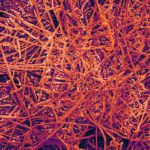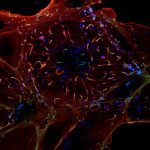A 3-year funded postdoctoral position funded by the Laboratory of Excellence Integrative Biology of Emerging Infectious Diseases (LabEx IBEID: http://www.pasteur.fr/labex/ibeid) is available in the department of Cell Biology and Infection at the Pasteur Institute in Paris. The project will study chromatin modifications, at the level of histones, which are fundamental regulators of gene expression in eukaryotes as they control the access of the transcriptional machinery to the targeted promoter regions. Recent studies have revealed that chromatin modifications induced by bacterial pathogens, like modifications induced by other cues, interfere with the host transcriptional program. However, the mechanisms at play are poorly characterized and the lasting impact of these modifications for the host remain unknown.
With a multidisciplinary approach, at the interface between microbiology, chromatin biology/epigenetics and innate immunity, this projects aims to (i) uncover the role of chromatin modifications in the establishment of infection by L. monocytogenes (via the characterization of the induced chromatin modifications, and the genes at which the regulatory marks are imposed) and (ii) determine whether these bacteria, either passively or actively, induce heritable changes in host chromatin, thereby providing a molecular memory of infection which would have important consequences for innate immunity.
The laboratory is located in the heart of Paris on the historic Pasteur Institute campus. This large campus houses 130 research groups and provides access to state-of-the-art core facilities including transcriptomics, epigenomics, proteomics, imaging, flow cytometry as well as animal housing.
We are looking for an enthusiastic, dedicated postdoctoral fellow to study histone modifications induced by the bacterium Listeria monocytogenes. The candidate should be curious about inter-disciplinary techniques and hold knowledge and experience in cellular and molecular biology.
The interested candidate should send a CV, motivation letter and 3 letters of reference to: Prof. Pascale Cossart (pascale.cossart@pasteur.fr) and Dr. Mélanie Hamon, (melanie.hamon@pasteur.fr). Please indicate “Histone postdoc application” in subject of email.
References:
- Hamon, M.A., and Quintin, J. (2016). Innate immune memory in mammals. Semin Immunol. Aug;28(4):351-8
- Pereira, J.M., Hamon, M.A., and Cossart, P. (2016). A Lasting Impression: Epigenetic Memory of Bacterial Infections? Cell Host Microbe 19, 579-582.
- Samba-Louaka, Pereira J. M., Nahori M.A., Villiers , Deriano L., Hamon M. A.# and Cossart P.# (# co senior author). Listeria monocytogenes dampens the DNA damage response. Plos Path, October 2014 (doi/10.1371/journal.ppat.1004470)
- Eskandarian, H. A., Impens, F., Nahori M.A., Soubigou G., Coppée J. Y., Cossart P. #, Hamon, M. A. # (# co senior author). A role for SIRT2-dependent histone H3K18 deacetylation in bacterial infection. Science. 341, 1238858 (2013)
- Bierne, M.A. Hamon, P. Cossart. Epigenetics and bacterial infections. Cold Spring Harb Perspect Med. 2, a010272 (Dec, 2012)
- Hamon, M. A., and P. Cossart. Histone modifications and chromatin remodeling during bacterial infections. Cell Host Microbe. 2008. 4:100-109
- Hamon M.A., Batsche E, Regnault B, Tham TN, Seveau S, Muchardt C, Cossart P. Histone modifications induced by a family of bacterial toxins. Proc Natl Acad Sci. 2007. 104: 13467-72.




